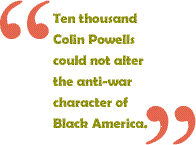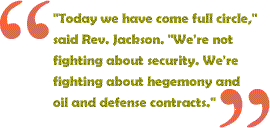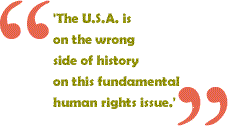|

The
A.N.S.W.E.R. coalition is serious about creating a genuinely
multi-racial movement against the pirates who control the U.S.
government. Of the 30 or so speakers that addressed hundreds
of thousands of anti-war protesters in Washington, January 18,
at least 17 were African Americans. Native-born whites were
a distinct minority on the microphone, also sharing the historic
moment with an international cast of activists from Latin America,
Asia, the Pacific, the Middle East and Africa.
A.N.S.W.E.R.
is the acronym for Act
Now to Stop War and End Racism. Folks with experience in
coalition building understand that nothing, nothing is
more politically sensitive than compiling a speakers list for
a tightly scheduled event. It is the public face of the movement
- or the movement that is envisioned - an irreducible statement.
A.N.S.W.E.R. stated plainly, for all the world to see, that
anti-racism is a core principle of the movement they seek to
build.
 The
crowd, which organizers numbered at 200,000 by noon, before
many contingents had even arrived, was predominantly white,
although otherwise quite varied by age, region and lifestyle.
We at The
crowd, which organizers numbered at 200,000 by noon, before
many contingents had even arrived, was predominantly white,
although otherwise quite varied by age, region and lifestyle.
We at  have no problem with the preponderance of white marchers. After
all, there are a lot more of them. Blacks ushered in
the modern era of Washington mega-demonstrations in 1963 and
held the nation's capitol as if we owned it in the 1995 Million
Man March. African Americans are the most consistently anti-war
demographic, by far. African American representatives comprise
the core of the Peace Party in the U.S. Congress. Ten thousand
Colin Powells could not alter the anti-war character of Black
America.
have no problem with the preponderance of white marchers. After
all, there are a lot more of them. Blacks ushered in
the modern era of Washington mega-demonstrations in 1963 and
held the nation's capitol as if we owned it in the 1995 Million
Man March. African Americans are the most consistently anti-war
demographic, by far. African American representatives comprise
the core of the Peace Party in the U.S. Congress. Ten thousand
Colin Powells could not alter the anti-war character of Black
America.
What
is most important - and what the anti-war movement of a previous
generation failed to fully understand - is that white people
who seek to build a movement must be prepared to accept leadership
from the ranks of those who have always been in motion.
There can be no hint of privilege in the struggle against Power.
The
Black contingent - a majority on the speakers platform - was,
itself, a coalition, comprised of politicians, religious leaders,
union activists, students, scholars - veterans of a thousand
marches against a multitude of grievances, a non-sectarian reflection
of Black America as a whole.
George
Bush was elsewhere, shielded from the bitter cold, but his
ears must have burned red. "You can't rob us of health
care, by spending billions of dollars on this dumb war in
Iraq," declared Mahdi Bray, of the Muslim American Society
Freedom Foundation.
"We
must fight the terrorism of lack of economic development in
our communities," said Brooklyn City Councilman Charles
Barron.
Everywhere,
placards like "Money for Jobs, Not War" proclaimed
the class issue. So did 18 year old A.N.S.W.E.R. Youth and
Student Coordinator and Howard University freshman Peta Lindsay:
"We are not the executives of Exxon and Mobile, and this
war is not in our interests."
Black
labor grapples with issues of race and class, daily. "Workers
and working  people
want jobs, but we want jobs in an economy that is built on
peace, not war," said Fred Mason, AFL-CIO statewide president
for Maryland and Washington, DC. people
want jobs, but we want jobs in an economy that is built on
peace, not war," said Fred Mason, AFL-CIO statewide president
for Maryland and Washington, DC.
New
York City Labor Against War co-convener Brenda Stokely sees
the connections, clearly. "Our fight for justice in the
workplace has to be part of our fight for justice in the world."
Former
Georgia Congresswoman Cynthia McKinney, displaced from her
seat by a Hard Right cash juggernaut last summer, denounced
the Bush family war on domestic democracy. "We won't
forget that your brother trampled on the voting rights of
the poor and people of color" in Florida, said McKinney.
"Dr. King warned us that we have guided missiles and
misguided men."
King
was omnipresent, universally invoked. Rev. Jesse Jackson recalled
a meeting on the civil rights leader's last birthday, January
15, 1968. At the top of the day's agenda were two items: civil
rights enforcement and an end to the war in Vietnam. "Today
we have come full circle," said Rev. Jackson. "We're
not fighting about security. We're fighting about hegemony
and oil and defense contracts."
Bill
Fletcher, the scholarly president of TransAfrica Forum, senses
madness in the air. "We stand on the edge of a precipice
of catastrophe, and if it were not so serious it could be
a skit on Saturday Night Live," said Fletcher, also co-chair
of United for Peace. Bush is enflaming the world. "What
will he do when the hordes of the dispossessed are at the
gates of the United States?"
Presidential
candidate Rev. Al Sharpton scoped the game in Bush's plan.
"Are we talking about weapons of mass destruction, or
a political game of mass distraction?" Deficits rising,
child care disappearing. "You can't fight in our name.
We will stand up, we will not back down, we will fight the
fight."
Detroit's
John Conyers, dean of the Congressional Black Caucus, was
the sole U.S. representative on-site. "You are the truest
patriots in this country, here today," Conyers told the
crowd, by now at least half as large as the population of
a congressional district. "Only American citizens can
stop this war, now. There is still time, brothers and sisters,
but not much."
Pam
Parker and Lucy Murphy, introduced as "cultural workers,"
sang their own composition, "Mothers Day," with the
moving refrain
You
take our money
You think I don't see
You use it to fire
On women like me
Other
African American speakers included: Larry Holmes, International
Action Center; Rev. Graylan Hagler, Plymouth Congregational
Church, United for Peace; Rev. Herbert Daughtry, House of the
Lord, Brooklyn; Viola Plummer, December 12 Movement; Damu Smith,
Black Voices for Peace; Imam Mousa, Masjid Al-Islam; and the
Reverend Lucius Walker, who read an anti-war statement from
Rep. Charles Rangel (D-NY).
Organizers
put the crowd at half a million. DC police say they no longer
do estimates.
Barbara,
Barbara!
San
Francisco A.N.S.W.E.R. headcounters claim 200,000 took to the
streets on Saturday - most of whom seemed to know the local
Black Congresswoman by name. "Barbara, Barbara," chanted
the crowd as Rep. Barbara Lee took the microphone. "The
silent minority has become the vocal majority because of you,"
said Lee, the only member of the House to vote against giving
Bush sweeping anti-terrorism powers in the immediate aftermath
of September 11, 2001. "It's not too late for the administration
to heed our call. It takes leadership to resolve conflicts peacefully.
It does not take leadership to drop bombs."
Chicago
landslide for peace
By
a vote of 46 to one, the Chicago City Council last week went
on record against a unilateral strike on Iraq. Alderman Joseph
Moore, chief sponsor of the "Resolution Opposing Pre-emptive
U.S. Military Strikes on Iraq," said foreign adventure
is a domestic concern. "The cost of the war will dry up
federal funding for domestic programs for a war that has yet
to be justified," Moore argued.
The
resolution reads:
NOW,
THEREFORE BE IT RESOLVED, that we, the members of the City
Council of the City of Chicago, oppose a pre-emptive U.S.
military attack on Iraq unless it is demonstrated that Iraq
poses a real and imminent threat to the security and safety
of the United States; and
BE
IT FURTHER RESOLVED, that we support a return of U.N. weapons
inspectors to Iraq, enhanced by sufficient police support
to guarantee unfettered access to all
targeted sites; and
BE
IT FURTHER RESOLVED, that we urge the U.S. to work through
the U.N. Security Council and reaffirm our nation's commitment
to the rule of law in all
international relationships; and
BE
IT FURTHER RESOLVED, that a copy of this resolution be forwarded
to the Illinois congressional delegation and the President
of the United States.
World
applauds Illinois Governor
 George
Ryan's last major act as Governor of Illinois was to spare the
lives of 167 death row inmates, earning him the eternal enmity
of much of the American public and most of his own, Republican
Party. Whatever popularity the former pharmacist lost in the
U.S., he has more than recouped abroad, according to the January
18 Washington Post. Ryan has been nominated for the Nobel Peace
Prize (by international lawyer Peter Boyle), glowingly editorialized
in newspapers across Europe (whose 44 nations have abolished
capital punishment), and received phone calls from a current
and former head of state. George
Ryan's last major act as Governor of Illinois was to spare the
lives of 167 death row inmates, earning him the eternal enmity
of much of the American public and most of his own, Republican
Party. Whatever popularity the former pharmacist lost in the
U.S., he has more than recouped abroad, according to the January
18 Washington Post. Ryan has been nominated for the Nobel Peace
Prize (by international lawyer Peter Boyle), glowingly editorialized
in newspapers across Europe (whose 44 nations have abolished
capital punishment), and received phone calls from a current
and former head of state.
Mexico's
Vicente Fox was grateful that three of his nationals were among
those spared by Ryan's commutation. More than 50 Mexicans citizens
await execution in the U.S. This month, Mexico asked the International
Court of Justice at The Hague to intervene, charging that the
men were denied their right to consult with the Mexican embassy.
Nelson
Mandela phoned Ryan with congratulations. The former South African
President was condemned to death by the apartheid regime in
1961 for his role in the armed wing of the African National
Congress. The sentence was later changed to life in prison.
Said
Amnesty International: "The U.S.A. is on the wrong side
of history on this fundamental human rights issue. Governor
Ryan has shown that change is possible and that principled human
rights leadership is crucial."
Bush's
Confederate heart
When
Woodrow Wilson walked into the White House in 1913, he brought
segregation with him, establishing separation of the races throughout
Washington's federal bureaucracy. Although often described as
a liberal because of his support for the League of Nations,
Wilson was a hard-core Dixiecrat. Born in Staunton, Virginia,
in 1856, Wilson viewed African Americans as an "ignorant
and inferior race." (See "Bush's
Ugly America," in this issue.) During Wilson's two
terms, the Klan thrived, North and South, with membership in
the millions by the time of Wilson's death in 1924.
Wilson
began a White House tradition of sending a wreath to the Confederate
Memorial at Arlington Cemetery each Memorial Day, in honor of
Confederate President Jefferson Davis. President George Herbert
Bush called a halt to the practice in 1990.
Time
Magazine reports in this week's issue that the White House is
once again paying homage to the Slave Nation President, payback
to Sons of Confederate Veterans official Richard T. Hines, of
South Carolina. Hines financed a mass mailing on Bush's behalf
during the 2000 Republican primary, railing against Bush opponent
John McCain's failure to support the fight to keep the Confederate
Flag flying atop the state capitol in Columbia. Bush won the
primary, and the wreaths began arriving again the Memorial Day
after he took office.
Affirmative
action, anyone?

www.blackcommentator.com
Your
comments are welcome. Visit the Contact
Us page for E-mail or Feedback.
Click
here to return to the home page
|

